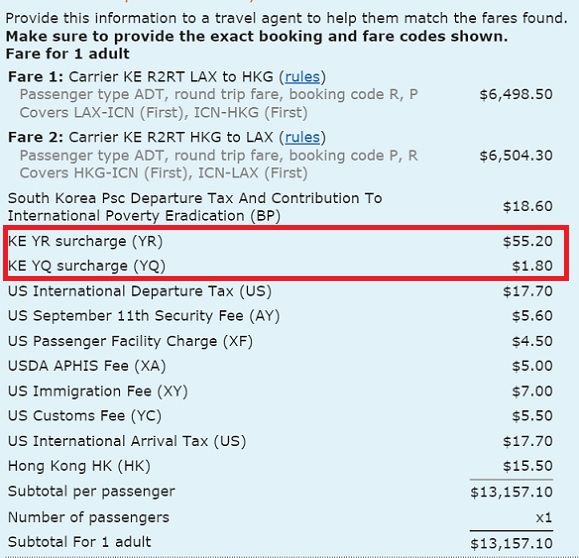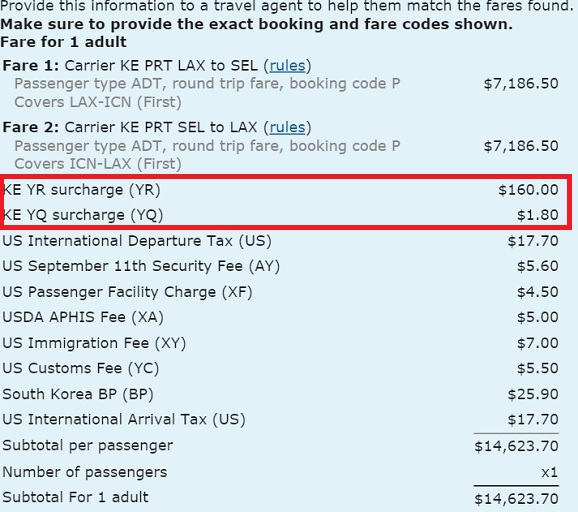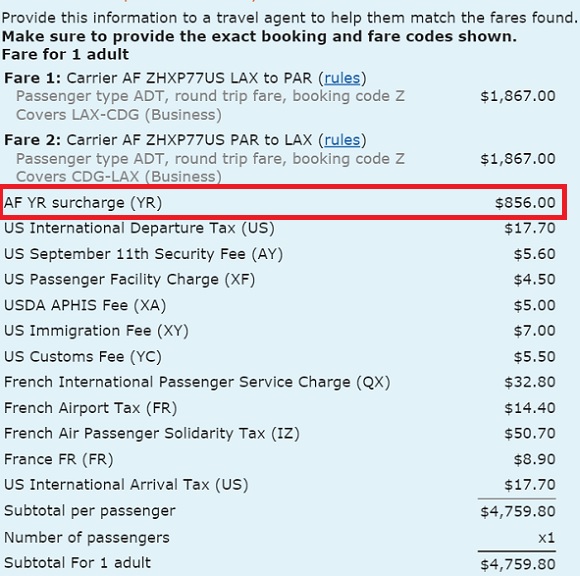In my post yesterday about the Korean Air Visa’s increased signup bonus, there were questions about fuel surcharges.
When I wrote about Korean Air’s new first class suite product, again fuel surcharges came up.

I’m a big fan of Korean Air first class. You can transfer Chase points to Korean Air’s SKYPASS program, and then redeem for first class awards.
- There’s very little competition for these seats, since you cannot use Delta miles to redeem for first class on Korean even though they are partners.
- Korean Air flies to more US gateways than any other Asian airline.
- Their first class award availability is amazing.
- They even offer first class on many intra-Asia routes.
If you want first class awards, you can generally get them. But you will pay fuel surcharges.
And the amount of fuel surcharge you will pay, in addition to miles and taxes, is the amount that would be charged on an equivalent paid ticket. That amount varies by destination.
There are some exceptions to this rule — for instance, Iberia charges a reduced amount when redeeming its own points for Iberia flights. And Virgin Atlantic charges a reduced amount for economy awards. But for the most part it isn’t about whatever amount the program chooses to charge, it’s adding the amount for the equivalent paid ticket.
Commenter tjp74 noted that the Korean Air suite “Looks like it’s based on Asiana and Etihad 1st suite.” And then expressed that booking Asiana first class using United miles would be a better deal.
Hold on a minute. Let’s challenge that assumption. Is it really better to save the fuel surcharges here?
United charges 240,000 miles roundtrip for an Asiana first class award between the US and North Asia.
Korean Air charges 160,000 miles (which can be transferred in from Chase). You’ll pay $57 in fuel surcharges for, say, Los Angeles – Seoul – Hong Kong and return.

For Los Angeles – Seoul – Los Angeles you’d pay $160 in fuel surcharges through Korean. I’d gladly pay $160 to save 80,000 miles.

Again, it varies by destination and some will be higher. Bangkok will run about $400 roundtrip.
Korean Air charges 190,000 miles for first class roundtrip between the US and Bangkok, plus that $400 in fuel surcharges and taxes. United charges 260,000 miles plus taxes. With Korean Air you’re going to have to come out of pocket, but that extra $400 saves you 70,000 miles ($0.0057 per mile). Granted, Chase points are worth more than United miles but this is still a swap that makes easy sense.
Let’s look at other destinations, though. Korean Air charges 80,000 miles roundtrip in business class between the US and Europe. That’s 45,000 miles less than Delta charges. (Delta will add fuel surcharges if your trip originates in Europe, but not if it originates in the U.S.)
Let’s look at a simple Los Angeles DC – Paris roundtrip. Fuel surcharges will run $856.

Now the case isn’t as easy. You spend 45,000 fewer points but come out of pocket a real chunk of additional cash. You’re paying 1.9 cents per point you save.
Although it also depends on what program’s award chart you’re comparing to — if you were booking via United MileagePlus, they get 140,000 miles roundtrip, and the savings is 60,000 miles — 1.4 cents a mile.
Again, it comes down to the destination and whether you’re more miles or cash constrained whether paying fuel surcharges make sense when using miles from a program like Korean’s whose award chart is quite reasonable.
On the other hand paying fuel surcharges through a program like British Airways’ — whose award chart is rather ludicrous for long haul premium cabin awards on top — is another story entirely.


Thanks, Gary, for the incredibly quick response to the question I posed yesterday. You are really amazing (and you write so well!)
Your info further confirms to me what a scam the fuel surcharges really are. If they aren’t based on distance (they are, after all, called a fuel surcharge) then what is the legal rationale for charging them?! Yes, that’s a rhetorical question but, at the moment, we are all faced with dealing with these inane charges. The British Airways lawsuit in New York did get past a motion to dismiss brought by BA but it will still take a long time to slog its way through the courts.
If airlines want to rebate their customers for their business, then they should do so. But they shouldn’t promise us rebates (in the form of miles to be used for free flights) and then play “Gotcha!” when you go to use them. Although US carriers, with their ever-changing (or no) award charts aren’t immune from game-playing, at least they don’t insult their mileage-program members with nebulous fuel surcharges.
Query: Do all foreign carriers charge the same amount in fuel surcharges for the very same route? (Using their parlance, do they all buy their fuel from the same supplier?) I was under the impression that each airline (besides the Iberia and Virgin examples that you gave) charge differing sums, with British Airways being the most avaricious. The cost-benefit analysis that you gave is spot on but in cases where the mileage requirements are similar, the fuel surcharge becomes an important factor.
Thanks, again, for sharing your constantly keen insight.
your posts are being hijacked by auto-play audio/video ads. very annoying. found today’s “screen” at the bottom, left of “top posts & pages”.
first ad was swiffer, then UA MP explorer card a few times, then nissan altima
there’s a microscopic “pause” button but it doesn’t seem to work.
I’m running chrome on a desktop, if that helps.
Not to mention UR can be used as a statement credit for a penny each.
@Colleen thanks, not sure why i am not seeing this but i will look into it
BA YQ and London taxes are what keep me up a night trying to figure out how to avoid them.
Fuel surcharges are a scam. This post reinforces this.
most programs that charge fuel surcharges require fewer miles for an award — so it kind of evens out. It’s not really a scam.
(BA Avios is a pretty terrible program however… in most cases you pay much more, in miles and in money than with other programs. But at least availability is good)
@colleen, I’m not seeing anything like that, and suspect the problem is on your system. You might want to read this: http://consumerist.com/2015/05/06/injected-ads-are-an-annoying-security-risk-affecting-millions-of-internet-users/
Here’s a particularly egregious example where an airline is charging much more in both miles AND surcharges: I just booked a Virgin flight in Upperclass from Heathrow to Atlanta for 40k miles (transferred from Amex). Fees and surcharges were about $525. Delta wanted 100,000 miles and $543 for the same flight.
Thanks for the tip, @Mary. It’s much appreciated by this admitted luddite.
@Mary as I mention in the post, Delta adds surcharges on itineraries originating in Europe. That makes the Virgin chart a better deal. But Delta should not want 100k for a one-way transatlantic business class partner award — they should want 62,500. If you saw 100k one-way on Virgin that’s a pricing error. I know that to be true even though Delta no longer publishes award charts.
@colleen it’s likely on my end even though i haven’t gotten other reports of it, i’ve seen reports of it on other boardingarea blogs. i am looking into this and appreciate the report.
@Gary, I saw dates (late August) that were 125k for the one-way, and many at 80k. Maybe it’s an error, but in the real world that’s what the average person who doesn’t know any better would be paying.
@Mary – for business class one-way on Virgin Atlantic (not Delta), and you’re searching now (this wasn’t back in 2014)? I’d love to know what dates and replicate that!
Here’s an idea. Rather than using the term “fuel surcharges” let’s start referring to these awards as “cash and points”. We are already used to this in the world of hotel redemptions and it gives us a level playing field on which to compare award flights.
Yep, one-way Upperclass VS flights on the Delta.com website now seem to be pricing properly at 62.5k miles, but I saw them priced at 80k, 100k and 125k yesterday, for flights in late August, mid-September and early December.
In any case, my original point still holds: 62.5 miles and $543 in surcharges when booking through DL is lousy compared with 40k miles and $525 in surcharges when booking directly through VS. In this instance DL is more expensive on both miles AND surcharges.
@TomSAN Not sure where all this anger is coming from. It would be incredibly naive to assume fuel surcharges have anything to do with the cost of fuel. I suppose one could argue YQ aren’t “fair” but neither are ridiculous prices, baggage fees, change fees, redeposit fees, etc.
As Gary has said many times, this surcharge is not and never has been associated with fuel. Many carriers now refer to YQ as a “carrier imposed surcharge” and it is considered to be part of the fare for revenue tickets (EQD earning). The fact that you (sometimes) have to pay it on top of award miles is unpleasant but certainly not surprising given the complexity of airfare/copays/fees/etc.
Most (if not all) U.S. carriers impose surcharges on international travel. Some airlines (UA) eat the cost of YQ for the consumer on award travel whereas others (AA) do not. Perhaps Gary can clarify the costs to UA/AA/etc. and whether UA must remit YQ to partner airlines as AA presumably does.
@Eddy: I don’t know that I am angry. I just may have a greater sense of outrage. While you say, “It would be incredibly naive to assume fuel surcharges have anything to do with the cost of fuel”, I say that language is intended to reflect thought. When earning a “free ticket” that comes with a cost when you choose to use it free because the airline decides to impose a “fuel surcharge”, and when the “fuel surcharge” has nothing to do with the cost of fuel, then that seems, to my eyes, to be a fraudulent series of misstatements designed to induce reliance. And I don’t care to be treated that way, plain and simple. “A la carte'” pricing may be irritating, but there is disclosure of those additional costs and a consumer can decide whether to use/pay for those “extras”.
@TomSAN I (like most of us) am a credit card churner. As such, I know that there is no such thing as a free lunch/flight. There’s hard pulls for apps, opportunity costs everywhere, time and gas money to consider, etc. So I guess I’m much more cynical = less outraged.
I’d support additional language in the FFPs regarding these “carrier imposed surcharges.” But I’m not surprised that these corporations are trying to pull the wool over our eyes.
P.S. I’m in SAN too!
I recently spent $450 for a surcharge on Lufthansa tickets. I was actually okay with that because of the convenience of the flight, plus I really like Lufthansa business class. It allowed us to fly into Orlando, which is fairly unusual from Europe. Orlando is not overloaded with international flights to Europe. Of course I also earned miles on the $450 that I spent on my Miles ‘n More credit card.